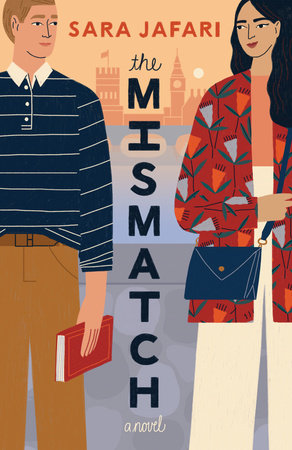 S.K. Ali. Misfit in Love, May. 2021. 320p. Salaam Reads / Simon & Schuster Books for Young Readers, $19.99. (9781534442757). Grades 9-12.
S.K. Ali. Misfit in Love, May. 2021. 320p. Salaam Reads / Simon & Schuster Books for Young Readers, $19.99. (9781534442757). Grades 9-12.
Misfit in Love, the sequel to S.K. Ali’s debut YA novel Saints and Misfits, is heartwarmingly funny, poignant and thoughtful, and contains a surprise or two. Returning to Egyptian and Indian American Janna’s story, this time for the wedding of her older brother, readers find Janna healing from the trauma she experienced in the last book and ready for romance and new beginnings. But of course things don’t go as she expects, and when she finds out that her father doesn’t approve of her love interest, Nuah, she is shaken.
Told through the events and cultural festivities surrounding a supposedly joyous wedding occasion, Ali brings to the forefront the prominent and often sidelined racial and cultural hegemony and supremacy found in the Muslim community and beyond. The revelations and lessons that occur for Janna, her family, and friends creates a dynamic that has new or returning readers questioning these dynamics in their own spaces in a way that is authentic and palpable. Throughout the story there are a number of instances in which Janna observes the characters around her create conflict, express disdain, or act negatively in regards to race or cultural identity. We see this with the older Arab auntie who expresses her distaste at the amount of South Asian elements during the wedding weekend. Or the way Janna’s father, a South Asian, recalls his experiencing racism from Janna’s Arab maternal family when he was in a relationship with her mother. Ali uses that narrative to show the hierarchical nature of hegemony, and how despite being on the receiving end of racism at one point, when Janna’s father realizes her budding feelings for long time friend Nuah, a Black Muslim, his initial reaction is racist and classist.
Janna calls out her father for his ignorance over multiple instances, and Ali creates a realistic portrayal of Janna’s reactions, internal conflict, and subsequent growth. There is also a distinct call to action that allows Janna and her family to move past performative allyship— at one point Janna refers to her father’s copy of The Autobiography of Malcolm X: As Told to Alex Haley, to tangible change.
Overall, these topics fit pretty well into the novel’s story without being too jarring or cliche. The author makes an important note in her acknowledgement at the end of the novel, expressing how she wants to remain considerate of the Black character’s–Nuah and Khadija–perspectives, and that she does not speak in their voices. Ali names MuslimARC as a vital resource in helping her write these characters respectfully in her novel and urges the Muslim community and the non-Black Muslim community in particular to embrace anti-racist principles as Islamic principles, and to question cultural supremacy and hegemony, its prevalence and how it manifests within the Muslim community.
Love and relationships in many stages are discussed at length in this novel, and Ali successfully presents diverse romantic relationships in the Muslim community. For instance, there is the young uncertain love that Janna experiences, the marriage of her older brother, the budding romance of Janna’s mother, and more. These scenarios are natural to the story and also provide different ways love and relationships come to develop without judgment or comparison. Each relationship is valid and unique. As Janna navigates her uncertain relationship and feelings, she confides in different friends and family members, who provide her a safe space to express her emotions. These positive representations of both female and male Muslim characters supporting Janna in her journey to understanding herself provide a much needed alternative to the strict and angry Muslim stereotypes that permeate mainstream pop culture. With the backdrop of this story being Janna’s older brother’s marriage, Ali gets the chance to present a very important cultural milestone in a non-exoticized or misrepresentative light. Readers unfamiliar with Muslim marriage practices can learn about some customs, while other readers that belong to these communities have a YA novel that they can feel connected to.
Janna’s experience with assault in the previous book is mentioned briefly and the reader learns that Janna sought the help of professionals to work through and heal from the trauma. Mental health is a pretty taboo topic amongst many cultures in the Muslim community, so Ali creates a stigma free association for the characters in the book, making sure to address Janna’s past trauma and the healing she needed to go through to find herself at a better place.
Ali’s characters are nuanced and authentic, the protagonist Janna especially is complex and interesting, as a Muslim teen her religion, relationship conflicts, and personality convey a seamless narrative that avoids didacticism. Small details like Janna nonchalantly talking about her scarf and her style, the female only party thrown for her sister-in-law, and inclusion of prayer give the story depth and reflections of Muslim life in a really natural way. At the same time, Misfit in Love will satisfy any YA reader looking for a realistic romantic comedy, while touching upon greater societal issues of race that all readers need to examine in all the spaces they are in.

 Four Eids and a Funeral
Four Eids and a Funeral This Is How You Fall In Love
This Is How You Fall In Love Mafi,Tahereh. This Woven Kingdom.
Mafi,Tahereh. This Woven Kingdom. 
 Love From Mecca to Medina by S.K. Ali
Love From Mecca to Medina by S.K. Ali This Woven Kingdom by Tahereh Mafi
This Woven Kingdom by Tahereh Mafi Salaam, with Love by Sara Sharaf Beg
Salaam, with Love by Sara Sharaf Beg
 The Mismatch by Sara Jafari
The Mismatch by Sara Jafari